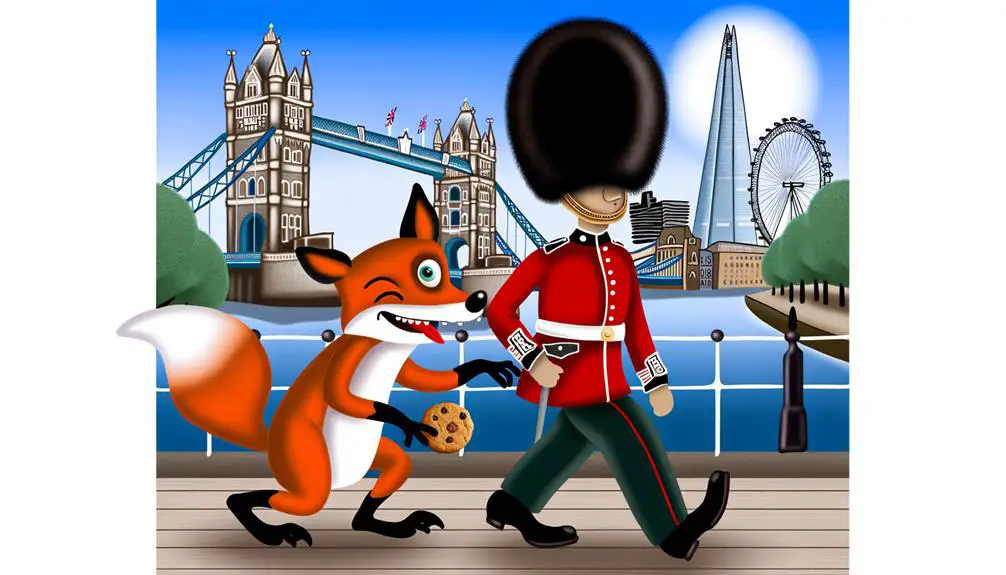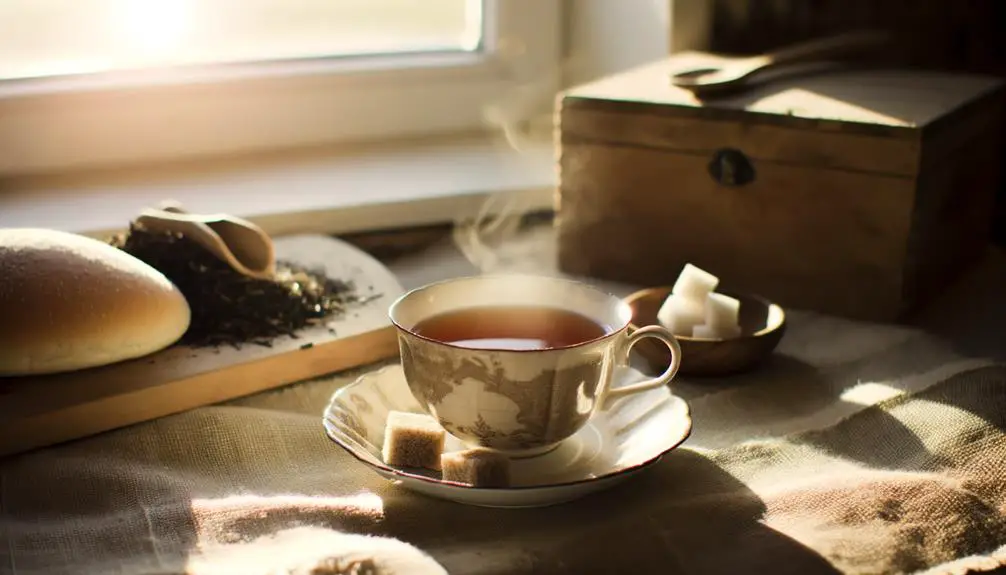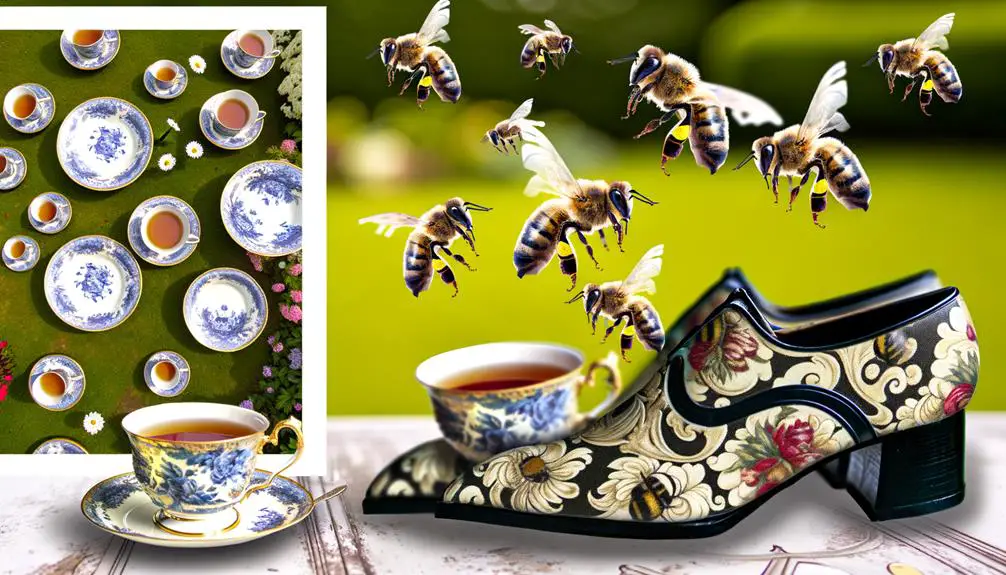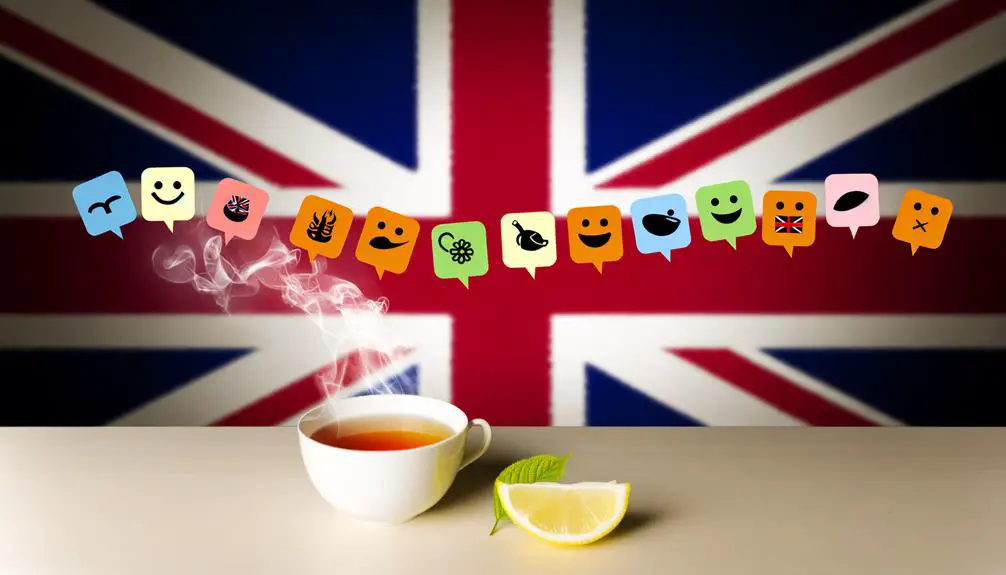You're stepping into a world where words like 'cheeky' and 'chuffed to bits' weave the tapestry of British social interactions. These phrases aren't just linguistic oddities; they're cultural treasures. 'Cheeky' captures a playful audacity, a hallmark of British wit. Imagine smiling with a twinkle in your eye—that's 'cheeky.' Then there's 'chuffed to bits,' embodying deep satisfaction, the kind that fills you up from toes to top. Each term tells a story of history, community, and the unique British way of seeing the world. Understanding them offers a deeper appreciation of British charm and character, pulling back the curtain on expressions that warm the heart. Uncover more such expressions and you'll find yourself smiling, perhaps even a bit chuffed.
The Charm of "Cheeky"

Diving into the heart of British slang, you'll find that 'cheeky' carries a charm deeply rooted in cultural nuances, reflecting a blend of audacity and endearment. This term, often tossed around in lively conversations, encapsulates more than just a simple adjective; it's an embodiment of a certain wit and spiritedness that's highly valued across the UK. When you engage in playful banter, throwing a 'cheeky' comment here and there, you're not just being impudent. Rather, you're partaking in a cultural dance of sorts, one that balances on the fine line between being daring and affectionately teasing.
Understanding 'cheeky' requires you to grasp the cultural nuances that give British humor its distinctive edge. It's this unique combination of boldness and charm that makes the use of 'cheeky' so quintessentially British. Whether it's a 'cheeky pint' after work or a 'cheeky smile' from a friend, the term infuses everyday moments with a sense of joy and light-heartedness. It's a manifestation of the playful spirit that pervades British social interactions, inviting you to not take life too seriously and instead, embrace a moment of levity.
Deciphering "Bobs Your Uncle"
Just as 'cheeky' embodies a unique blend of boldness and charm within British slang, 'Bob's your uncle' serves as another intriguing phrase, steeped in cultural heritage and offering a glimpse into the enchanting nature of the English language.
The origin story of this expression is as mesmerizing as the phrase itself. It's believed to have surfaced in the late 19th century, possibly linked to a notable figure or event, illustrating how historical contexts often shape the slang we use today. This phrase, embodying a sense of completion or success ('and there you have it' or 'as simple as that'), showcases the playful side of English vernacular, where a familial term is used to signal the effortless achievement of a task.
The global variations of 'Bob's your uncle' highlight its adaptability and the universal appeal of such idiomatic expressions. From the bustling streets of London to distant lands where English is spoken, the phrase has been embraced and integrated into various cultures, each adding a unique twist while retaining its original essence. This journey from local slang to global idiom underscores the dynamic nature of language, constantly evolving yet somehow remaining familiar.
The Sweetness Behind "Cuppa"

Steeping in the rich tapestry of British culture, 'cuppa' emerges as a term that encapsulates the nation's enduring love affair with tea, reflecting both a simple pleasure and a complex ritual that resonates deeply within the societal fabric. When you hear someone in Britain offer you a 'cuppa', you're not just being invited to share a drink; you're being welcomed into a tradition steeped in history and cultural significance. This isn't merely about quenching thirst but about pausing, reflecting, and connecting.
The act of making a 'cuppa' is imbued with ritual, from the boiling of the water to the steeping of tea and the adding of milk or sugar to taste. It's a gesture that signifies a break from the hustle and bustle, a moment of tranquility in the chaos of daily life. The cultural significance of this ritual can't be overstated; it's a bond that ties communities together, a shared heritage that transcends social and economic divides.
In essence, 'cuppa' is more than just a slang term for tea; it's a symbol of British identity, representing comfort, hospitality, and the importance of taking a moment to truly connect with one another.
Understanding "Chuffed to Bits"
In the vibrant lexicon of British slang, 'chuffed to bits' stands out as a phrase that captures the essence of profound satisfaction and pride, reflecting a deeply ingrained cultural tendency to express joy in a uniquely understated yet unmistakable manner. Its origin story is as colorful as the expressions it adorns, tracing back to the early 20th century, where 'chuffed' initially meant puffed with fat or pleased. Over time, 'to bits' was added, amplifying the sense of overwhelming happiness or pride.
When you hear someone say they're 'chuffed to bits,' they're basically conveying that they couldn't be happier or more pleased about a situation. This phrase paints a vivid picture of emotional fulfillment and content:
- A student receiving top marks on an exam they've worked tirelessly for.
- An artist seeing their work exhibited for the first time.
- A grandparent witnessing their grandchild's first steps.
Understanding 'chuffed to bits' gives you a glimpse into not only the British way of communication but also their cultural fabric. Its global usage has grown, yet it retains a special resonance within the UK, embodying a quintessentially British blend of modesty, humor, and heartwarming sincerity.
Embracing "The Bees Knees"

Exploring another gem of British slang, 'the bees knees' offers a fascinating insight into how expressions of excellence and high quality have evolved within UK vernacular. This phrase, with its whimsical imagery and historical origins, is a reflection to the playful yet profound nature of language evolution in Britain. You'll find that 'the bees knees' was popularised in the 1920s, a period rife with linguistic creativity, much like its global counterparts which also embraced unique expressions to denote the pinnacle of achievement or quality.
Delving deeper, you'll notice that the phrase's charm doesn't just lie in its quaintness but also in its capacity to bridge cultural gaps. When you compare it to similar idioms worldwide, such as 'the cat's pajamas' in the United States, it's evident that the need to express admiration in a quirky, endearing manner is a universal linguistic phenomenon.
This exploration not only enriches your understanding of British slang but also enhances cultural awareness, revealing how language serves as a mirror to societal values and changes. 'The bees knees', with its blend of historical richness and global parallels, underscores the importance of linguistic expressions in shaping and reflecting collective identities.
Frequently Asked Questions
How Has the Influence of American English Impacted the Usage and Popularity of These British Slang Terms Among Younger Generations in the Uk?
You've noticed Americanization effects altering British slang among the youth, largely due to digital platforms' influence. This cultural shift reflects a growing blend of linguistic trends, highlighting an evolving, interconnected global cultural awareness.
Are There Any Regional Variations in the Meanings or Usage of These Terms Across Different Parts of the United Kingdom?
You're stepping into a world where regional dialects shape the linguistic landscape. Across the UK, linguistic diversity guarantees that meanings and uses of terms vary, reflecting a rich tapestry of cultural awareness and identity.
How Do British Slang Terms Like These Contribute to the Identity and Cohesion of English-Speaking Communities Outside of the Uk, Such as in Australia or Canada?
You'll find that British slang terms foster a sense of belonging and cultural integration in communities like Australia and Canada, thanks to language borrowing. They're key in maintaining ties and enhancing cultural awareness abroad.
In What Ways Have British Slang Terms Been Adopted or Adapted by Non-Native English Speakers Around the World, and What Challenges Do They Face in Understanding Their Nuances?
You've noticed British slang's global reach, but you're facing language barriers and cultural misinterpretations. These obstacles challenge your grasp of nuances, affecting how you connect with these expressions and their original cultural context.
How Do These British Slang Terms Reflect Historical or Cultural Events in the Uk, and Have Any of Them Evolved in Meaning Over Time Due to Such Influences?
You're immersing yourself in linguistic evolution analysis, examining how slang etymology mirrors UK's historical events. These terms have transformed, underscoring cultural shifts. It's a thorough exploration into how language adjusts over time, demonstrating cultural awareness.
Conclusion
As you journey through the dense forest of British slang, you've encountered whimsical creatures like 'Cheeky' monkeys and stumbled upon the secret gardens of 'Cuppa'.
Each phrase, a hidden gem, reveals the rich tapestry of British culture, where 'Bobs Your Uncle' signifies a magical conclusion and 'Chuffed to Bits' expresses pure joy.
In this enchanting land, language isn't just a means of communication but a celebration of life's small pleasures, making you truly understand why 'The Bees Knees' is such a sweet spot in the hearts of the Brits.







